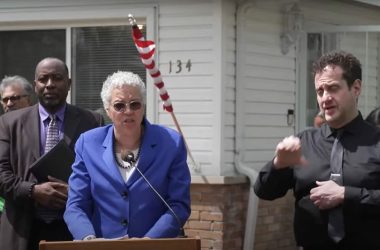Leading National Food Waste Expert Pens Consumer Guide to Saving Food & Money
NEW YORK—(ENEWSPF)–September 29, 2015 –U.S. consumers are collectively responsible for more wasted food than farmers, grocery stores or any other part of the food-supply chain—a problem that costs the average family an average of about $1,500 every year—but a new book seeks to help change that, one meal at a time.
The Waste-Free Kitchen Handbook—out today from Chronicle Books—offers simple consumer tips and tools to saving money and food, from the grocery store to the kitchen.
“Imagine walking out of the grocery store with four bags full of food, dropping one, and not bothering to pick it up—that’s essentially what American families are doing every day,” said Dana Gunders, author and scientist at the Natural Resources Defense Council. “Wasted food is wasted money, wasted energy and wasted water. Armed with simple tips and tools, families can make a major dent in what’s currently getting tossed out with the trash—and put a little cash back in their wallets at the same time.”
Americans are throwing away 40 percent of food in the U.S., the equivalent of $162 billion in wasted food each year. Until now, many well-intentioned home cooks have lacked the tools to change their food waste habits.
Gunders’ handbook—packed with engaging checklists, simple recipes, practical strategies, educational infographics and custom kitchen audits—is the ultimate tool for reducing food waste at home. It dispels the illusion that cutting food waste requires significant time and money, with easy tips for how to:
Cook with leftover ingredients (including 20 tasty “use-it-up” recipes)
Grocery shop smarter
Plan meals better
Decode expiration dates
Store foods properly
Use your fridge to its full potential
Understand shelf-life, storage & usability for 85+ common groceries
These guides can not only put more money back in consumers’ bank accounts, but reduce the strain on our environment. When food is wasted, so are all the resources that went into producing it:
25 percent of our nation’s fresh water goes into producing food that is never eaten.
If global food waste was a country, it would have the world’s largest greenhouse gas footprint after the U.S. and China—food waste just in the U.S. is responsible for emissions equal to those from 33 million cars.
Food waste is the single largest component of solid waste in U.S. landfills.
28 percent of the world’s agricultural land—an area larger than Canada—is used to grow food that gets wasted.
“Food waste is a global problem we can tackle in our own homes,” Gunders said. “When we throw out perfectly good food, we throw out all of the resources used to get it to our table—massive amounts of land, energy and water—along with it. Small, easy changes in our daily routine can add up to big benefits for the environment, and big savings in our pockets.”
Gunders’ book comes shortly after both international and national leaders announced new action to combat food waste. On Sept. 16, the Obama administration announced a goal of cutting food waste in half nationwide by 2030. And on Sept. 25, the countries of the United Nations announced the same goal for the retail and consumer sectors on a global scale.
With U.S. consumers collectively responsible for more wasted food than farmers, grocery stores or any other part of the food-supply chain, the action we take in our homes can play a critical role in meeting these new targets.
AUTHOR BIO:
Dana Gunders is a staff scientist at the Natural Resources Defense Council and leads NRDC’s work on reducing the amount of food wasted across the country. Her research on food waste has been featured by CNN, NBC, Last Week Tonight with John Oliver, The New York Times, Wall Street Journal, NPR, and many other outlets. Dana holds a B.S. and M.S. in Earth Systems from Stanford University, and lives in Berkeley, CA with her husband, daughter, and husky mutt.
FOR MORE INFORMATION:
Buy the book here: http://www.chroniclebooks.com/titles/waste-free-kitchen-handbook-pb.html
NRDC’s Wasted report: http://www.nrdc.org/food/wasted-food.asp
Dana’s blog: http://switchboard.nrdc.org/blogs/dgunders/
The Natural Resources Defense Council (NRDC) is an international nonprofit environmental organization with more than 2 million members and online activists. Since 1970, our lawyers, scientists, and other environmental specialists have worked to protect the world’s natural resources, public health, and the environment. NRDC has offices in New York City, Washington, D.C., Los Angeles, San Francisco, Chicago, Bozeman, MT, and Beijing. Visit us at www.nrdc.org and follow us on Twitter @NRDC.
Chronicle Books
One of the most admired and respected publishing companies in the U.S., Chronicle Books was founded in 1967 and over the years has developed a reputation for award-winning, innovative books. Recognized as one of the 50 best small companies to work for in the U.S. (and the only independent publisher to receive this award), the company continues to challenge conventional publishing wisdom, setting trends in both subject and format, maintaining a list that includes much admired illustrated books and gift products in design, art, architecture, photography, food, lifestyle, pop culture, and acclaimed children’s titles. Chronicle Books’ objective is to create and distribute exceptional publishing that’s instantly recognizable for its spirit, creativity, and value. For more information about Chronicle Books, visit www.chroniclebooks.com.
Source: www.nrdc.org








